For Australia to meet its emission reduction targets, most (if not all) homes will need to stop using gas. Some jurisdictional governments are beginning to implement policies to limit the growth of residential gas connections and incentivise purchasing electric appliances to get this transition started.
Positively, most households will save money in the long-term by switching to electric appliances, as electric appliances are cheaper to run than their gas alternatives. These savings will be even greater for the growing number of homes with rooftop solar. Households connected to the mains gas network pay around $1 per day in supply charges, regardless of how much gas they consume. Therefore, disconnecting from the mains gas network will lead to nearly $400 per year in ongoing bill savings for each household.
Under current policies, homeowners face the least barriers to electrification and therefore are likely to be the homes to electrify first (equity issues that surround the transition off gas are to be discussed in a follow-up blog). Around two in three Australian homes are owner-occupied.
Our Energy Consumer Behaviour Surveys show that many homeowners with a mains gas connection are thinking about switching their gas appliances for electric ones. This consumer interest is leading to action, especially in the ACT, with disconnection rates exceeding connection rates for the first time in 2022-23.
Homeowners with a gas connection increasingly think it is likely they will replace their gas appliances with electric ones
Over the past three years there has been a clear shift away from homeowners thinking they definitely wouldn’t, or would be unlikely to, replace gas appliances with electric ones.
How likely Australian homeowners with a mains gas connection think it is that they will swap gas appliances for electric ones in the coming 5 to 10 years
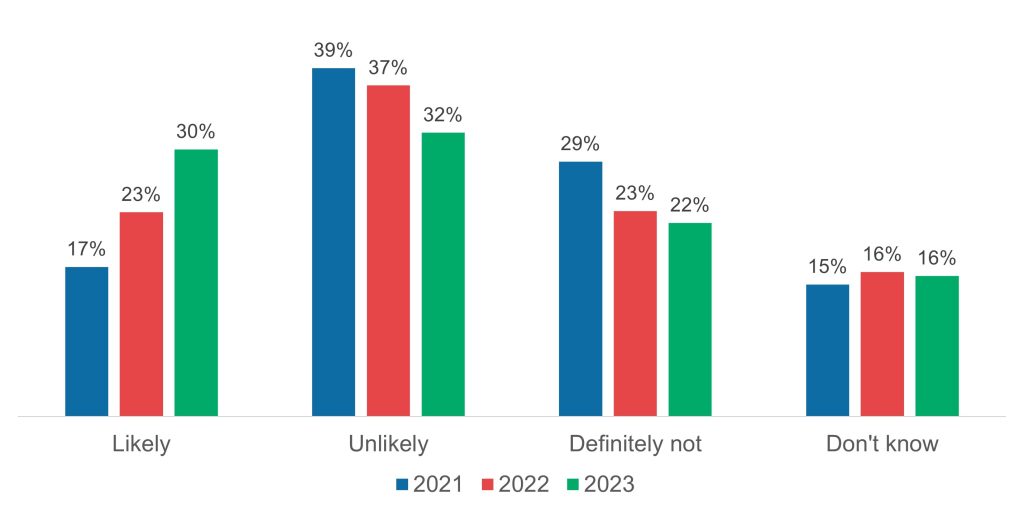
Q: Over the next 5-10 years, how likely do you think it is that your household will remove gas appliances (hot water system, heaters or cooktop/oven) and swap for electric appliances?
Explore our consumer survey data
A growing number of homeowners with a mains gas connection are thinking about going fully electric
Now nearly 50% of homeowners with a gas connection say they have given thought to removing their gas supply.
Australian homeowners with a mains gas connection: attitudes towards removing mains gas connection and running on electricity only
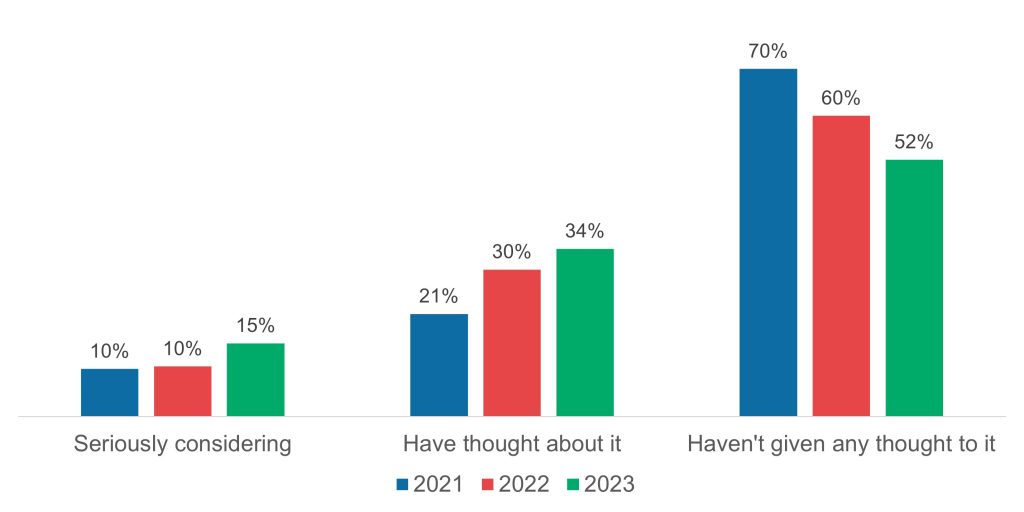
Q: Some Australian households/businesses have recently been cancelling their gas supply and converting their home to running on electricity only. Which of the following best describes you?
Note: Question was amended in 2023 to give respondents the option to select ‘don’t have control over this decision’. 4% of homeowners selected this option.
More homeowners across Australia are considering swapping gas appliances for electric ones
The ACT and Victorian governments recently implemented policies to prevent new residential mains gas connections in their jurisdictions. Unsurprisingly, homeowners in these jurisdictions have thought about electrification the most. However, increased consumer interest in electrification isn’t just limited to these jurisdictions.
Proportion of homeowners with a mains gas connection who said it was likely that they would replace their gas appliances with electric ones in the coming 5 to 10 years
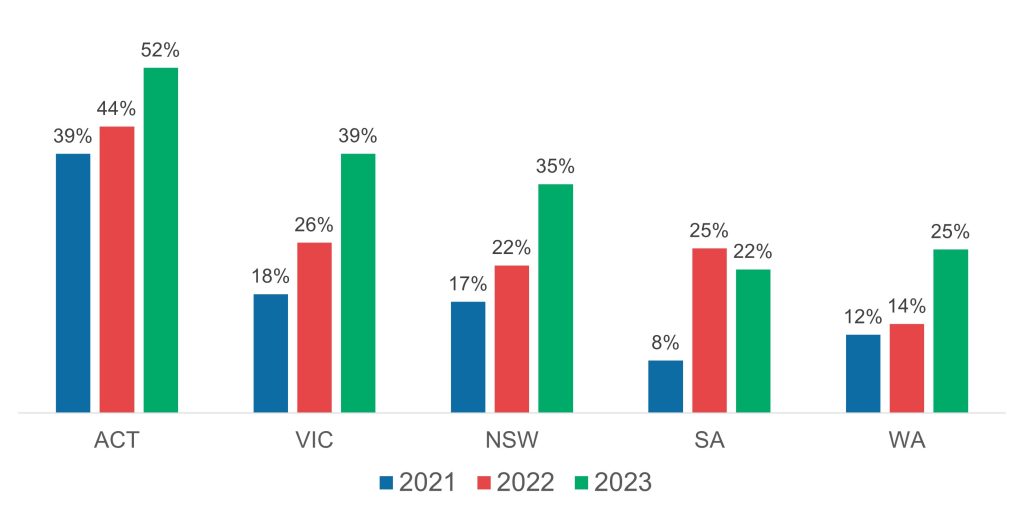
Q: Over the next 5-10 years, how likely do you think your household will remove gas appliances (hot water system, heaters or cooktop/oven) and swap for electric appliances?
Note: QLD and Tasmanian households are not shown due to a small sample size (< 90)
ACT leads all jurisdictions for homeowners considering removing their mains gas supply
Nearly one in three ACT homeowners now say they are seriously considering removing their mains gas supply. They are more than twice as likely to be seriously considering cancelling their gas supply and converting to electricity compared to the rest of the nation.
Proportion of homeowners with a mains gas connection who said they were seriously considering removing their mains gas supply and running on electricity only
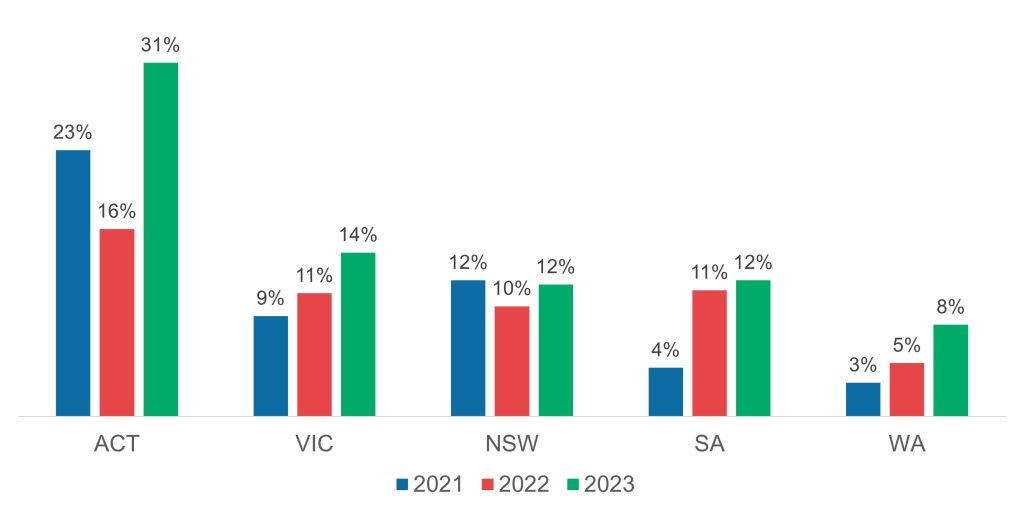
Q: Some Australian households/businesses have recently been cancelling their gas supply and converting their home to running on electricity only. Which of the following best describes you?
Note: Queensland, Tasmanian and Northern Territory homeowners are not shown due to a small sample size (< 90)
Residential gas network disconnection rates in the ACT exceeded connection rates for the first time in 2023
In the ACT, consumer consideration for removing the main gas connection is leading to action. As shown below, gas distribution network disconnection rates have increased significantly in the ACT in recent years. Therefore, with the recent announcement banning gas in new homes encouraging change, increasing gas network disconnection rates may soon be coming to Victoria as well.
Number of residential gas distribution network connections and disconnections per financial year in ACT
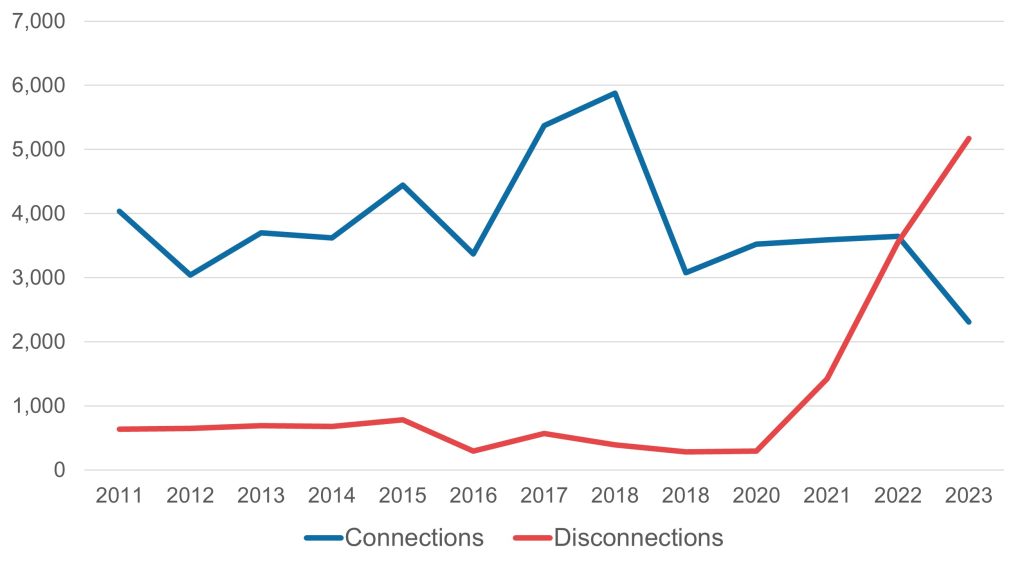
Source: Analysis of Evoenergy Gas Distribution Network Regulatory Information notices.
Consumers deserve certainty
Consumers and industry deserve certainty about what the future holds for gas. What these trends show is that when consumers receive this policy certainty from governments, they start to move towards action.
Of course, there are still barriers to navigating this change. This means it’s important that consumers have access to the right information, at the right time, to empower them to make decisions about how to electrify their home to suit their home’s unique situation.
Explore our consumer survey data

